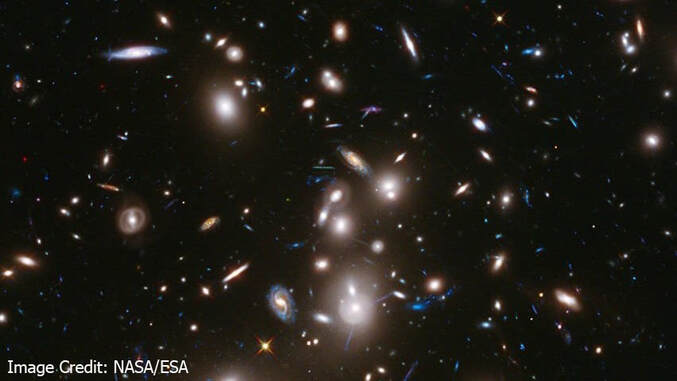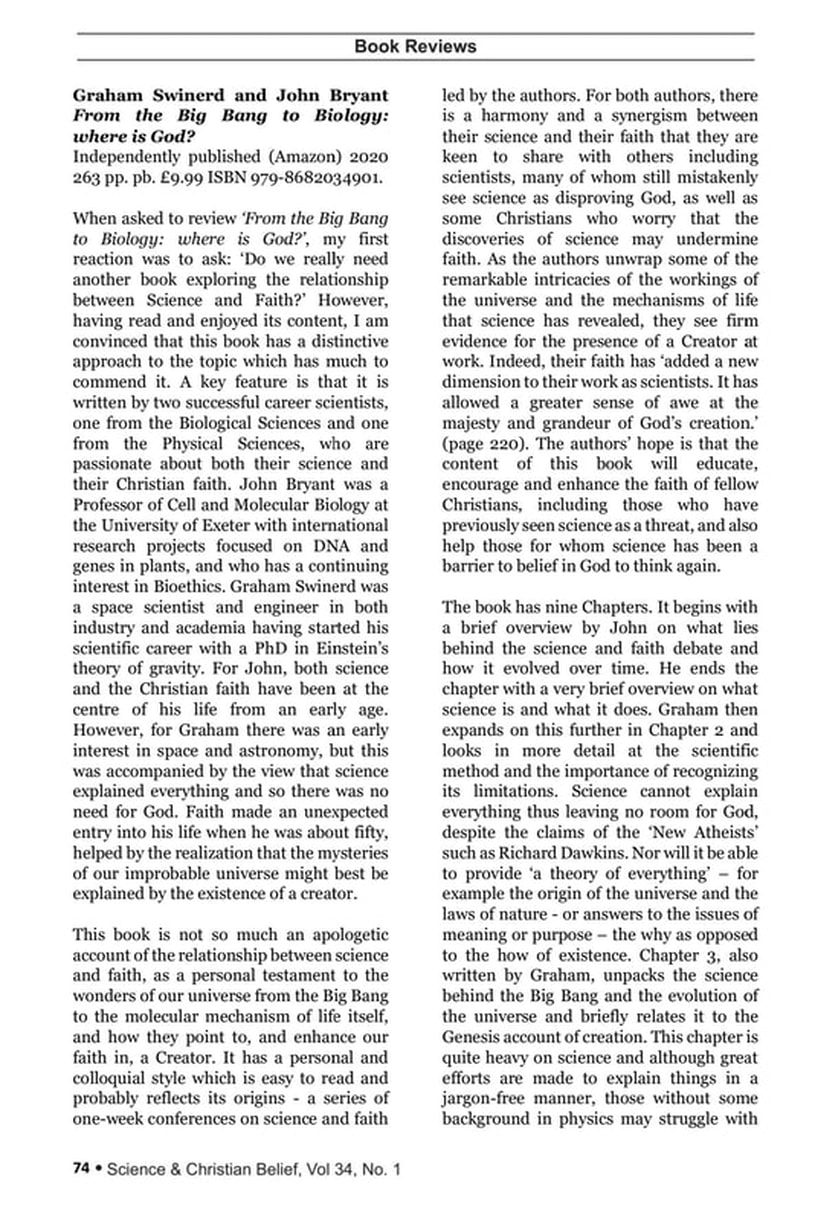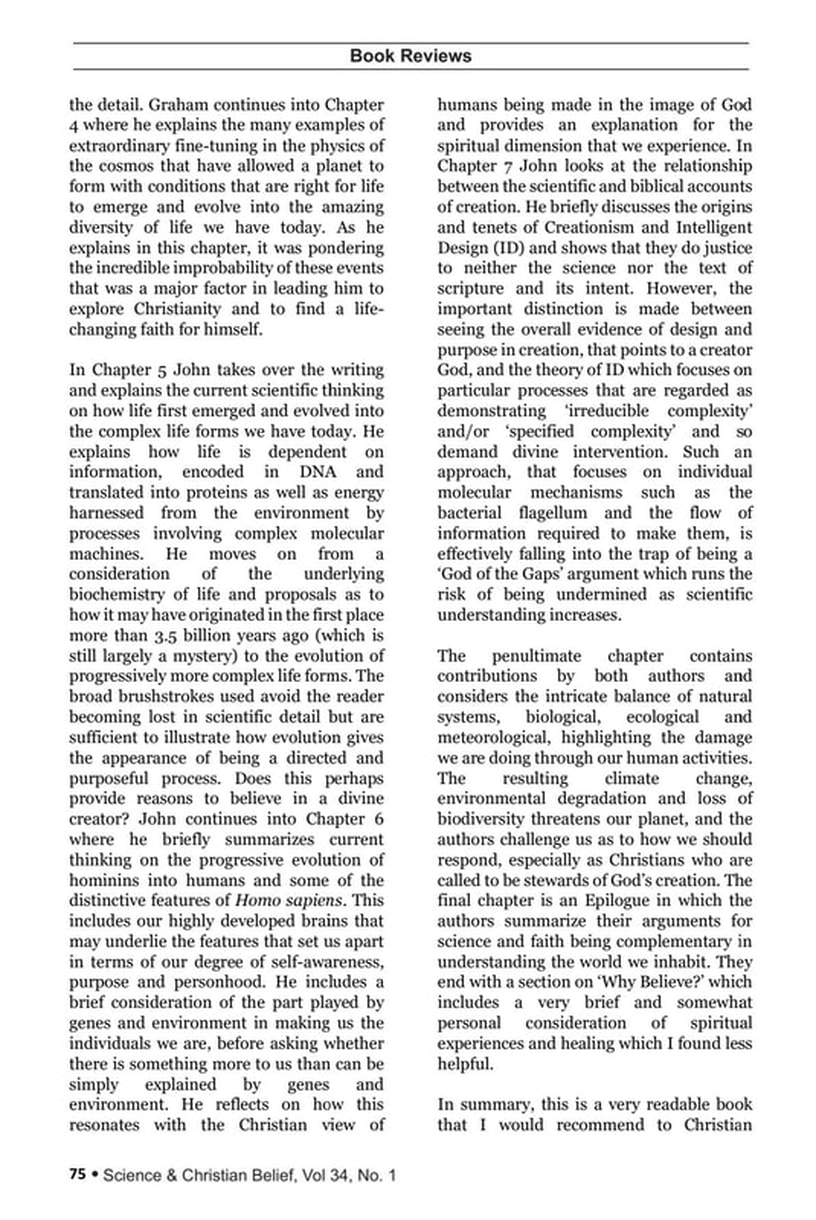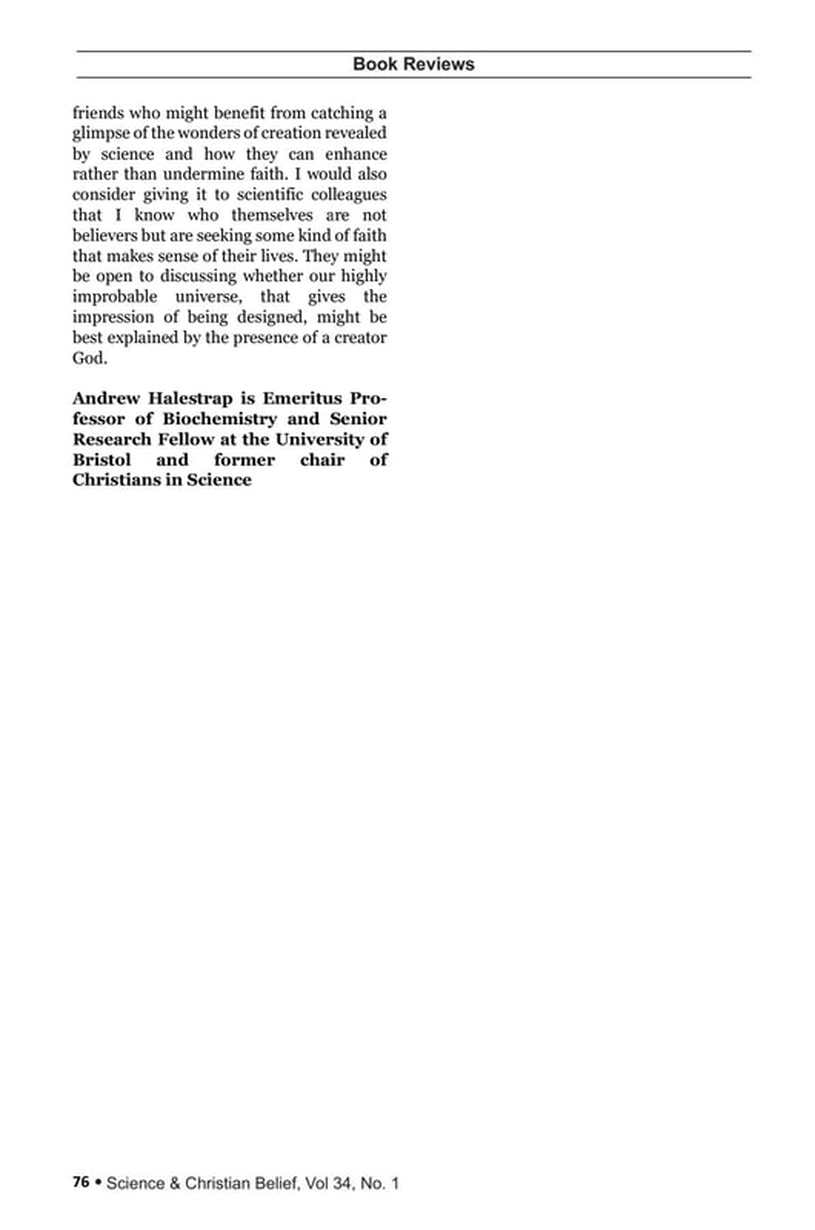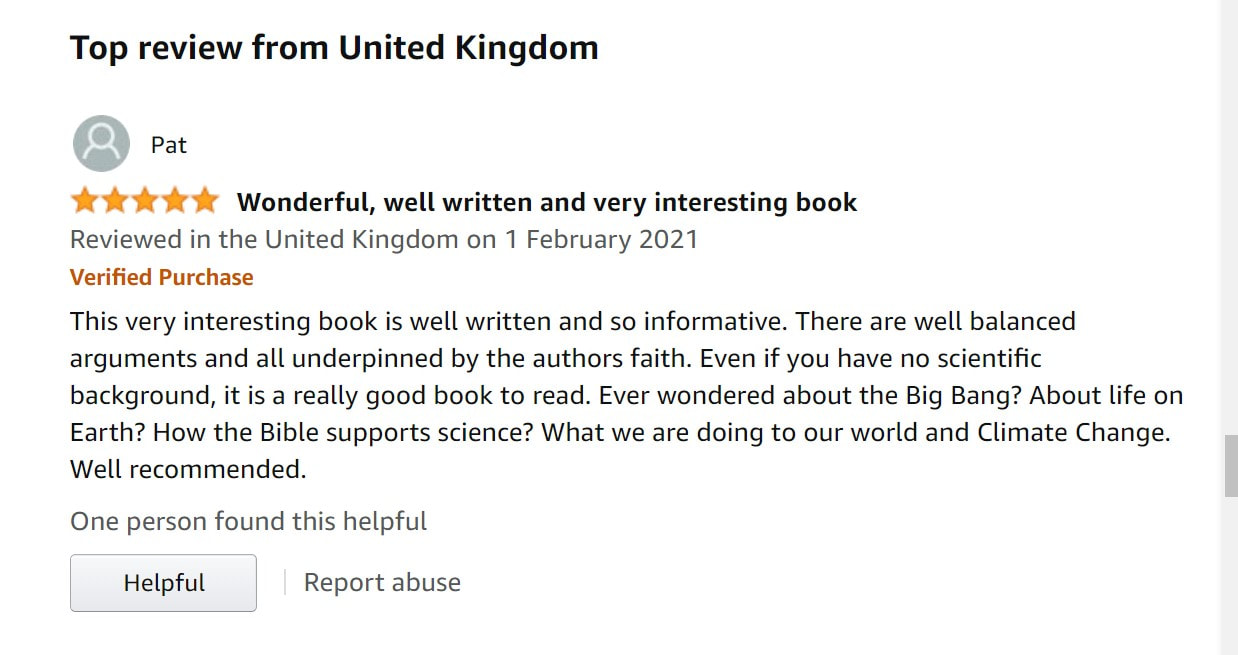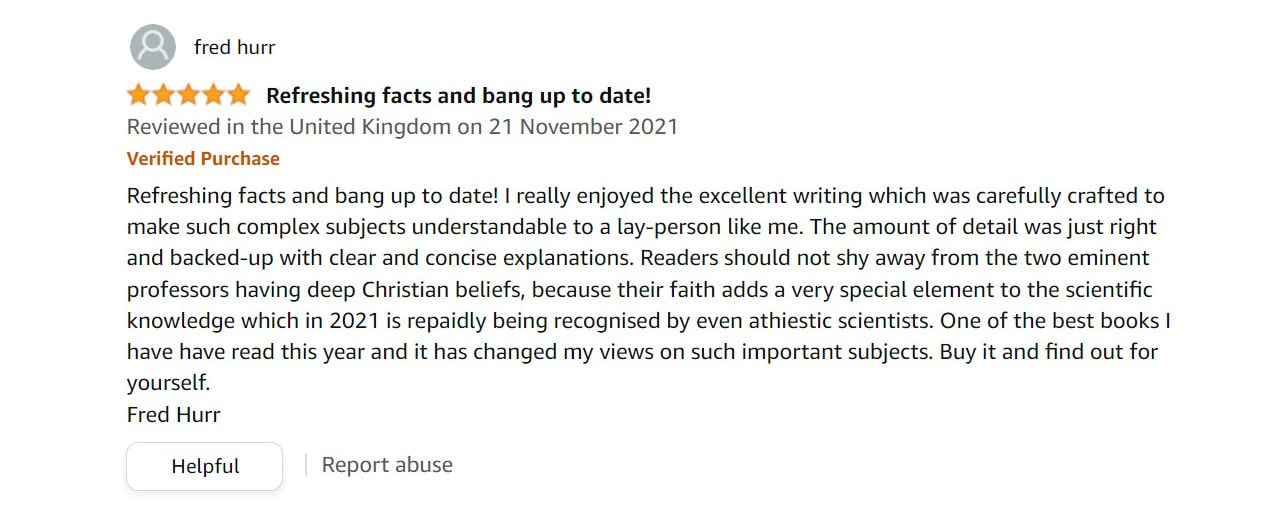Review in the Journal of Science and Christian Belief, Vol. 34, pp. 74-76, (2022) by Andrew Halestrap, University of Bristol, UK.
Review
I just wanted to say how much I enjoyed reading your latest book ... . It makes for an excellent balance of different aspects of science and how they relate to our Creator! It certainly gave me some wow moments both in the cosmology and the biology. And thank you Graham for sharing your own testimony so clearly.
I understood almost all of it but must admit I got a bit lost with inflation and false vacuum! It was when I did general relativity in my undergraduate degree that I realised I just had to accept the equations and not try to understand things ‘physically’ any more. On the other hand, biology is an area I have shied away from completely (I gave up biology as soon as I could at school because I couldn't stand the idea of dissecting rats!!) but John's section has opened my eyes to some fascinating things so I'm glad you've brought these two areas together like this.
Congratulations on a really high quality book! I didn't want to put it down!
David Thompson, Southampton, UK
|
Review (on Amazon UK store)
|
Review (on Amazon UK store)
Review
This book is an excellent resource for anyone - with or without a scientific background and with or without a faith in God - who is grappling with the big questions of existence. It is brimming with amazing examples and illustrations from modern science translated into language that conveys the enthusiasm and wonder of how the world works without the reader needing a PhD in either physics or biology. It also provides one of clearest explanations I have ever read of the way science is not only compatible with faith in God, but how it can actually strengthen and deepen our faith and appreciation of God as more and more of the beauty and complexity of creation is revealed. A scientist can indeed worship God by doing his or her job!
Last, but not least, I also found the summaries of what science can do and the many important aspects of our lives that lie outside its scope very helpful.
Liz Cole, Stroud, UK
Review
Having enjoyed the input you [both] gave at Lee Abbey in November, I’ve also subsequently enjoyed reading your book, which I’ve just completed. I don’t feel equipped to offer a [formal] review, but I just wanted to pass on my appreciation for all the conviction and insights you have both packed into these pages. As a non-scientist I have to admit some of the more technical content was somewhat beyond me (e.g. Chapter 5), but overall it has given me a deepened assurance that science and faith complement each other, and that both combine to enrich the wonder of our existence (and indeed the provision of sermon ideas!).
Thank you also for sending on the slides from the talks, which I am continuing to enjoy digesting.
Every good wish
Rev. John Harper, Peterborough, UK
A delegate on the November 2021 conference ‘From the Big Bang to Biology with God’ held at Lee Abbey, Lynton, Devon, UK
Having enjoyed the input you [both] gave at Lee Abbey in November, I’ve also subsequently enjoyed reading your book, which I’ve just completed. I don’t feel equipped to offer a [formal] review, but I just wanted to pass on my appreciation for all the conviction and insights you have both packed into these pages. As a non-scientist I have to admit some of the more technical content was somewhat beyond me (e.g. Chapter 5), but overall it has given me a deepened assurance that science and faith complement each other, and that both combine to enrich the wonder of our existence (and indeed the provision of sermon ideas!).
Thank you also for sending on the slides from the talks, which I am continuing to enjoy digesting.
Every good wish
Rev. John Harper, Peterborough, UK
A delegate on the November 2021 conference ‘From the Big Bang to Biology with God’ held at Lee Abbey, Lynton, Devon, UK
Review
“From the Big Bang to Biology: where is God?” is written by scientists to demonstrate that scientific knowledge and religious faith are not mutually exclusive. Indeed, as they explain the parts of their expertise which cause them most wonder, and describe their own, very different, faith journeys, it’s evident that for them the one enriches the other. Non-scientists needn’t fear over-technical explanations as both authors communicate their scientific knowledge in easy-reading language with helpful diagrams too! Challenging the commonly held view that science has rendered faith redundant within the context of their knowledge and lived experience makes for a compelling read.
Jen Ball, Southampton, UK
Review
The authors of "From the Big Bang to Biology: where is God?" are well qualified scientists and in addition to a substantial text, provide a glossary (pp. 223-229) of mainly scientific terms. As the title suggests, three threads run through this book. Graham discusses the physics/astronomy, John the biology and both find that faith and science can work together.
Graham (pp. 13-107) gives an excellent, detailed account of the Universe’s history from very shortly after the Big Bang to now. Theologians and philosophers have long proposed that there are other realms of existence such as heaven. Recently, cosmologists have attempted to give a physical basis for other universes, the multiverse concept. So far this is speculation, and Graham was not impressed 25 years ago. However, to his surprise, he found that being in a part of the Universe that is extraordinarily fine-tuned for life nudged him into belief in a creator, designer God. This happened in mid-life and then faith became more personal, when Jesus became a living part of his life.
John, an emeritus professor of molecular biology at Exeter University, has been a person of faith from his early days. In 50 pages he outlines the story of life. Since the only life known so far is on this planet, this is what he explains succinctly and thoroughly with the help of many diagrams and tables to describe the variety, intricacy, and development of life. It is a story at variance with a literal interpretation of the Bible which some people abide by rigidly. There are, however, other and fruitful ways of interpreting Scripture and the authors (pp 161-173) opt for a symbolic, allegorical approach.
I found the book very stimulating. John and Graham argue that the scientific study of nature and its development is in harmony with a belief in God. They also see that materialistic science on its own is incomplete. It doesn’t, and cannot, account for their own experiences of the ‘numinous’ and I would contend that in human life we need non-material values such as love, truth and justice to drive or weigh our activities and that includes science.
Altogether this informative, well-written book weaves faith into an accurate up to date scientific description of life and the Universe.
W. John Young, Wellington Somerset, UK.
March 2024
W. John Young, Wellington Somerset, UK.
March 2024
